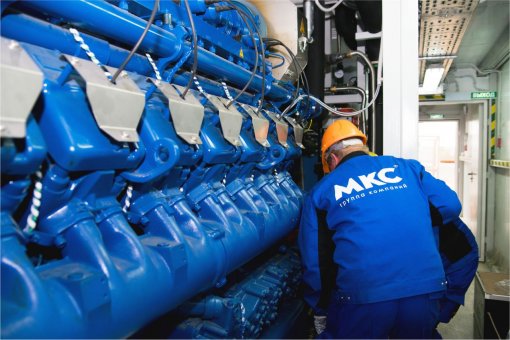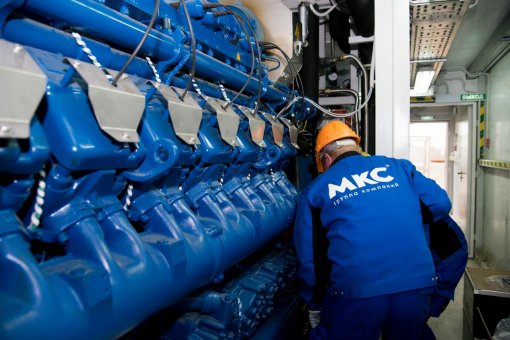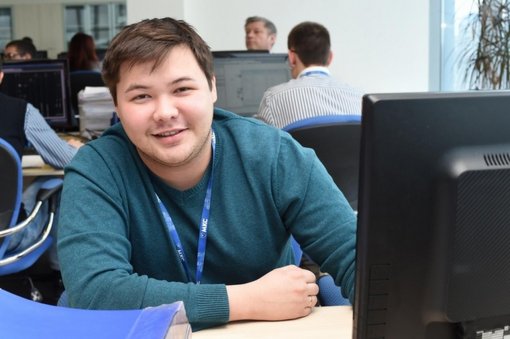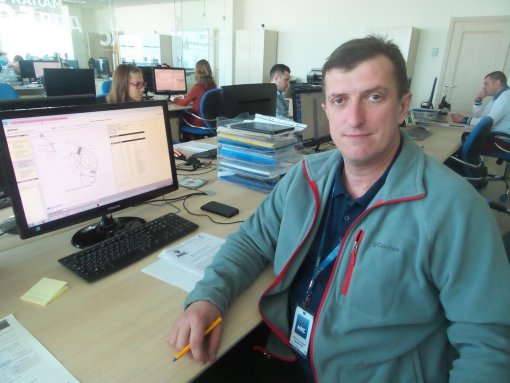June 1, 2017, 1:08 pm
The "ISS" energy ambulance
They "breathe life" into the iron machines, put the most high-tech engines into operation, they debug all the systems of the power center and prepare the facility for full-scale operation. And then... Then they closely monitor, including remotely, how the "iron heart" of the mini-HPP beats, how its "vital organs" function, and in case of emergency situations, they are the first to come to the rescue. Today in the section "Close-up" - employees of the Service Department of MKS Group of Companies, our "energy ambulance", people who, like doctors, follow the golden rule: it is easier to prevent a disease than to treat it.
It is quite difficult to catch employees of the Service Department at their workplace in the office: they often go on business trips to the sites. That is why they agree to an interview with an obligatory condition: if it is short. "Of course!" - we promise and start asking the first questions to Ilyas Bulatov, Head of the Service Department.
- Ilyas, earlier you headed the Design Department, now you head the Service Department. Did you feel the difference, do you have your own specifics of working in different departments?
- Of course. This is a completely different kind of work in terms of its content and nature. In the service department, the main thing is efficiency. We have to be one step ahead of events. We have to keep our finger on the pulse. Monitor the situation at the facilities on a minute-by-minute basis. And all this is for the timely prevention of abnormal situations. It is like in medicine: it is better to prevent a disease than to treat it (smiles).
According to Ilyas, the Service Department of MKS Group has two main areas of work: commissioning of new facilities and maintenance of mini-HPPs that have already been put into operation.
- Pre-commissioning works at an object last from 4 to 5 days, - says Ilyas. - Usually, this is the busiest, most responsible period for the whole company, a kind of "X time", which determines how well the whole team has worked. The first three days are preparation and testing of all systems at the site. The fourth and fifth days are spent debugging and testing the equipment, and making adjustments if necessary. The optimum variant is when the object starts to operate fully after that. In the case of non-standard situations, you have to make non-standard decisions.
- How important is technical improvisation in your work? Do the engines "capriciously" show their character, how do you make them work in unison?
Alexey Galichev, a master of the Service Department of MKS Group of Companies - a man who has "revived" more than one iron machine, who underwent certified training at the MWM® manufacturing plant in Germany - joins the conversation.
- Yes, you are right, each engine has its own character. You'd think they'd be iron machines made on an assembly line. But no! Each one has its own nuances. It is our task to discern them, to find the "key" to each engine. I would partly compare our work to that of a musical instrument tuner: step by step, tone by tone, we fine-tune all the systems and make them work and sound like a single mechanism.
No less important in the work of the specialists of the Service Department is the maintenance of the facilities that have already been put into operation. At the moment, MKS Group has 8 power plants under service control, and not only its own, but also third-party power plants: YuGK-1, YuGK-2, YuGK-3, YuGK-4, SUSU, Modern-Glas, Ariant, Mayak (Yekaterinburg). A number of facilities are remotely monitored by means of telephone communication (once a day our specialists call the customer's personnel, and in case of abnormal situations they visit the facilities). A dispatching system has been introduced at some mini-HPPs (YGK-1, YGK-3, SUSU).
- A modern gas power plant is essentially a mini-factory that turns gas into electricity, and this process can now take place without human involvement," says Ilyas Bulatov. - The only thing that is required is remote control of the processes. In this respect, we are greatly assisted by the dispatching system that was introduced in the MKS Group of Companies 7 years ago.
Together with Ilyas, we go to the company's dispatch center located on the 16th floor of Chelyabinsk-CITY. There are 6 computers working in the room, and Artem Kiliev, the dispatcher of the service department, is on duty.- As you can see, through Internet communication, we remotely monitor the operation of each power plant that is connected to the system," explains Artem. - Data on 180 technical parameters (temperature, pressure, voltage, power, etc.) are sent online to this control center. If any of the parameters fails, for example, antifreeze starts to leak, a warning appears on the computer screen. If the breakdown is not eliminated in time, the emergency mode will be activated.
- And what professional qualities are required for a dispatcher's work?
- First of all, attentiveness, technical literacy, and the ability to predict the situation," says Artem. - It is very important to pay attention to changes in any parameters, even minor ones, because sometimes a small thing can lead to a serious accident.
As Ilyas and Artem told us, remote control allows us to make real-time decisions related to the operation of the mini-HPP equipment. If necessary, it is even possible to stop and start the plant's operation. In addition, the dispatch center receives images from video cameras that are installed in the premises of power plants. In case of equipment failure, this allows us to understand what caused the problem. After all, an abnormal situation can be caused, for example, by an unauthorized person entering the facility.
- Ilyas, and in general, how do you assess the level of professional competence of the employees of your department?
- High enough. As of today there are 10 specialists working in the service department and all of them are qualified, responsible, constantly improving their work culture and knowledge level. This summer we are planning further training of our department employees at the MWM® manufacturing plant in Germany, which will strengthen the skills of independent commissioning of all levels of complexity. In addition, it is planned to launch the dispatching service in round-the-wall mode and to connect new objects to this system. We have a lot of plans and a lot of work. And I am sure we will cope with everything.
Maria Nevolina
 ru
ru en
en








